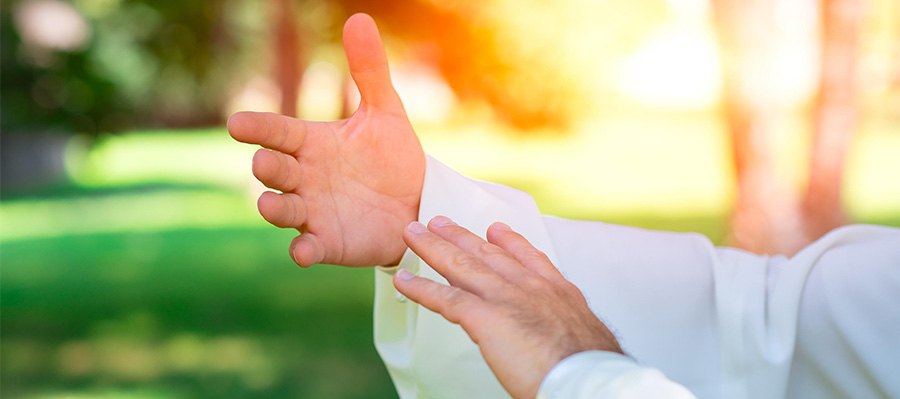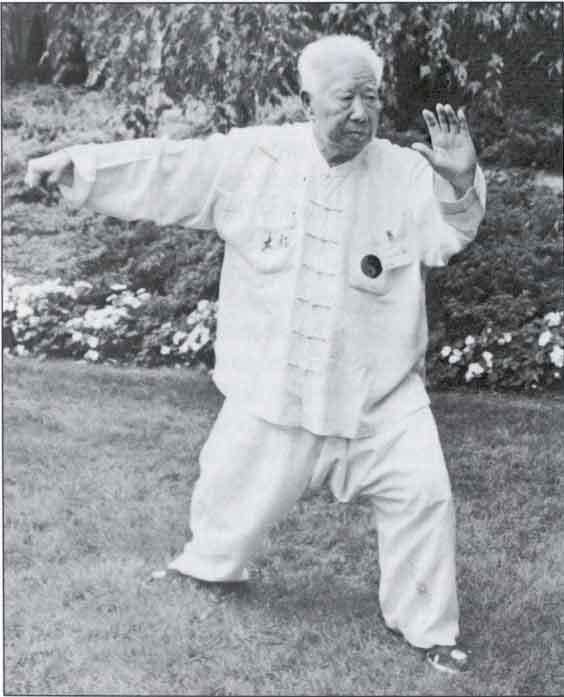We are an organisation dedicated to pursuing the Taoist arts of Yang style Tai Chi Chuan, various forms of Chi Kung, and meditation.
Benefits

“The significance of forms does not lie in their surface appearance. The secret lies in the startling discovery, the true seeing of who, or rather what, is doing them.”
– Tony Henrys, September 2009
The Tai Chi Chuan Form and Internal Principles
There are many ways of interpreting and teaching the Tai Chi forms. There are also many levels of achievement. Unfortunately, only a small number of students get past the initial levels. All the major classical forms of Tai Chi Chuan place great emphasis on adherence to the internal principles. Without knowledge of such principles, any accomplishment will be greatly restricted. What follows is a suggested guide for beginners as a way of learning and practicing the forms in their entirety, that is, in mind, body and spirit. Additionally, the truly sincere practitioner must mutually develop knowledge of the Tai Chi Classics and the subtle, advanced principles of Pushing Hands. With deepening insight and progress, these principles can provide an excellent framework for daily life.
Physical, Psychological, Spiritual
The Form
Practice involves an ongoing refinement and understanding of postures, their practical and symbolic meaning. Fundamental principles of structure, alignment, applications and above all, relaxation. In this context, relaxation is being mindful of softness, smoothness and stillness in every action.
Practice involves an ongoing refinement and understanding of postures, their practical and symbolic meaning. Fundamental principles of structure, alignment, applications and above all, relaxation. In this context, relaxation is being mindful of softness, smoothness and stillness in every action.
Yin-Yang
Incorporating the aspects of Yin and Yang. Developing movement coordinated with breath. Learning to distinguish clearly between full and empty. Realising a heightened awareness and sensitivity through the whole body.
Focusing
Learning to co-ordinate physical movement, breath and the attention of the eyes equally throughout the form. All methods of meditation, including Tai Chi Chuan, necessarily involve body, mind and spirit. This helps with the cessation of thought, and with stillness of mind during practice.
Centering
Relaxed awareness is given to the movement and direction of the dan tien (centre), and understanding its role in the correct distribution of power in each posture.
Chi
The spiraling open and close movement of the arms, torso and legs throughout the form are developed together with focused intention. This brings the higher faculties of the mind into play, and allows a greater flow of energy.
Opening
This includes every aspect of the above principles and much more. As this incorporates everything in a kind of multi-levelled alignment, it could be termed the Shen or Spirit form. Focus is primarily on the centre, but in a different way. It is different because the focus is at a centre that is everywhere and nowhere.
Each posture contains a threefold close-open-close aspect, which may be accompanied by distinct breathing methods.
Each movement expands continuously within a deep and powerful creative silence; indeed, an unspeakable reverence in which the subtle senses and intuitive perception are discovered.
These are the beginnings of awakening to the dignity of the Spirit. This is a dimension, which becomes no longer the subject of complex analysis or blind speculation, but of pure and simple experience.
The opening to such an experience may occur at any time of practice, and at any level of learning. However, it is only when it is experienced again and again through correct practice that the capacity for true knowledge in the art develops.
Meditation
Meditation is the creative expression of your happiness, peace and joy.
Many people meditate to achieve better physical or emotional health. Some people meditate to awaken so called spiritual energies or psychic powers. The irony is, however, that whilst some benefits may be obtained for a while, if a system or method is rigidly fixated on, it can create greater anxiety and greater suffering. Any form of meditation or practice where there is a degree of control or manipulation runs contrary to the natural way of things.
In a sense, meditation is a non-doing. It is simply resting and allowing everything to be as it is. There is no need to try to achieve or attain some special state because all states come and go. Everything changes in what is. When attention is on what is changing there inevitably follows a sense of struggle, a need to assert or defend one’s position. When attention returns to one’s natural awareness there may be recognised an innate freedom, a pure unchanging awareness of immense beauty which was simply overlooked in our obsession of projecting attention outwards.
Sages and Seers of ancient cultures have pointed this out for centuries. In China it is known as the Tao. Intellectual knowledge of the natural way of things, or the Tao is of little use. What matters is its deep realisation. Therein lies the usefulness of true meditation.
Fu Zhongwen – A Tribute to my Teacher

Towards the end of his life, Grandmaster Fu Zhongwen, nephew and disciple of the renowned Yang Chen Fu said, “I do not claim that my Kung Fu is the greatest of all, but in matters concerning the Yang style, no second person knows more.”
I had the privilege of studying with him at his home in China, and, at Shanghai Sports University in the late 1980s/90. I can fully attest to that statement, but in itself, it does not do him justice. His level of attainment, in every aspect of the art, was outstanding. As a younger man he was known across China as ‘undefeatable’ when
representing his Master at various events. Despite this, he explained to me that his ability compared to his Master’s was ‘as small as the tip of his finger’.
Tai Chi Chuan means ‘Way of realising the Supreme Ultimate Reality’. This great art originated in ancient times on Mountains and in Hermitages from learned scholars. Tai Chi is a term pointing to the ‘Natural State’ at the core of our Being. Depending on the tradition there are many words for this. More commonly, in Oriental philosophy it is known as Enlightenment, Self Realisation or simply, the Tao. Grandmaster Fu Zhongwen clearly embodied this principle.
With immense patience, he meticulously corrected my Tai Chi forms for health and martial aspects. He answered endless questions and stressed the necessity for earnestness, sincerity and constancy in one’s practice. He emphasised that such an attitude brings its own energy, and, is essential to realise true accomplishment in the art. I asked how he was so obviously passionate, indeed, in love with Tai Chi, after so many decades of practice. He replied it was because he had seen so many people helped or healed and had benefited, beyond measure in his own life.
He was a man of great humility and power. A man who lived what he taught. He had practised the forms handed down through the Yang family by Great Grandmaster Yang Chen Fu with precision and utter sincerity. Fu Zhongwen truly epitomised Tai Chi. With a lifetime of dedication to his art and the students he taught, he was held in the highest esteem. He was an inspiration to all who had the honour of learning from him. In my case, it was life-changing.